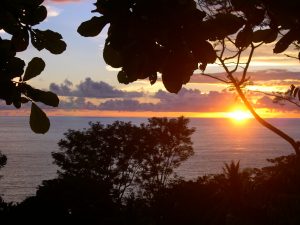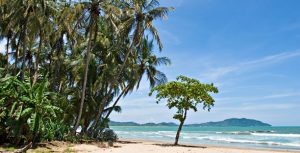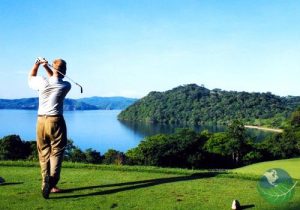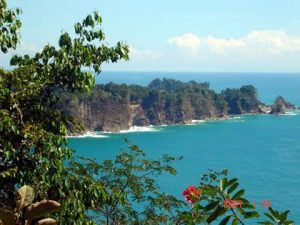How two friends made a dream about early retirement come true in Central America
The first thing I see each morning when I step out on the porch of my home in Costa Rica is the ever-changing Gulf of Nicoya.
As I write this (in September), it’s the rainy season, which means there are a hundred hues of green in the trees between my side of the mountain and the gray-blue glassy sea. On this particular morning, I can see two small fishing boats on the water between the local ferry port and several forested islands in the distance. It’s not yet 7 a.m., and I can already tell that the temperature will reach the mid-80s by noon.
I’m 60 years old and retired from a 35-year career as a legal secretary. How I came to live on the Pacific coast of Costa Rica is a story about early retirement, tight budgets and lots of planning.
My best friend, Carol, and I began thinking seriously about retirement roughly 12 years ago. We knew we wanted to retire early, but we recognized that our small nest eggs (and the fact that Medicare doesn’t kick in until age 65) could make that difficult. Eventually, we concluded that living outside the U.S. would allow us to stretch our dollars and retire on (our) schedule. Thus was born a 10-year plan: five years to pay down as much debt as possible, and five years to find a home overseas.
Perfect 10
We agreed on 10 criteria in our search for a retirement destination: warm weather; a country with a stable democracy; a four-hour plane ride or less from the U.S.; adequate and affordable health care; American-friendly; located near or by an ocean; clean and abundant fresh water; affordable housing; a cost of living at least 50% lower than in the U.S.—and good coffee.
We pored over maps, read guidebooks, evaluated countries we had visited, and subscribed to every publication we could find on the subject of international living. Our research kept pointing us in the direction of Costa Rica.
After a total of seven trips to this small country (about the size of New Hampshire and Vermont combined, with a population of about 4.6 million), we found “home”: a two-story house (with, as noted earlier, stunning water views) in the rural village of Playa Naranjo. Carol retired and moved here in early 2010, and I followed a year later.
Costa Rica makes it fairly easy for expats to settle here—save for one peculiarity. Nonresidents (like me) qualify for a 90-day visa but have to leave the county for 36 hours at the end of the 90 days. Then, you turn around and obtain a new 90-day visa. (An easy solution: holidaying in neighboring Panama or Nicaragua, or even Colombia for a couple of days.) Retirees may apply for residency with proof that they receive a monthly income of at least $1,000 from a permanent pension source or retirement fund. I may apply when I turn 62 and start collecting Social Security.
At the moment, I don’t have a job here, although at some point (once my Spanish improves) I would like to work as a tour guide. Besides doing normal household chores, my days are spent taking long walks, going to the beach (a 10-minute stroll), swimming in one of two local pools, napping, reading and corresponding with family and friends. We’re blessed with wonderful neighbors, a mix of native Costa Ricans (called Ticos) and expats from Canada, Belgium, Germany, the Netherlands, Scotland, Spain, Italy, Singapore and the U.S. Especially during the dry season (November through March), parties (“fiestas”) are plentiful.
Costly Fuel
Friday is market day. We drive to Jicaral, a thriving farming community about eight miles from our house, where local farmers set up colorful displays of fresh fruits and vegetables near the town square. With gasoline costing about $5 to $6 a gallon, we do our best to share rides with neighbors. And that pretty much sums up the cost of goods in Costa Rica: What is grown here is cheap; what is imported is not.
We spend about $50 a week on food (for two people). Native fare is rice and beans (about $2 for about two pounds), potatoes, yucca, onions, red peppers and carrots (about 25 cents each). For $1 you can buy three cantaloupes, or two avocados, or four mangos, or three oranges (in season), a watermelon, or a whole pineapple and enough fish to feed two. Two pounds of ground beef (86% lean) or boneless chicken cost about $4. On occasion, I’ll splurge, paying about $6 for a bag of Cheetos or miniature chocolates.
Affordable Housing
Housing prices are off their highs of two or three years ago. You can buy a nice two-bedroom home on about an acre of land for between $100,000 and $300,000. My utility bill is $50 to $150 a month, depending on how much I use the air conditioning. My property tax last year was under $100.
Health care, meanwhile, has turned out to be exactly what we were looking for: affordable and more than adequate. There are two health-insurance systems: a public-sector plan (similar to health-maintenance organizations in the U.S.) and a more comprehensive private plan (about $1,500 annually). Both cover doctor visits, prescription drugs and hospital care.
No, the country isn’t perfect. Cultural differences are sometimes frustrating and always humbling. Ticos are some of the most friendly and nonconfrontational people in the world. Sometimes, that’s a problem for goal-oriented gringos. For example, you ask when the big bags of dog food are arriving at the feed store—and the proprietor, with a smile, will answer, “Martes.” Translation: “Señora, I don’t know when the truck is coming in, but you Americans always want to know a date or time, so I’m saying Tuesday.”
In short, patience is not a virtue here; it’s a necessity. There may be five customers in front of you at the bank to see an account representative. Bring a book. Most likely you will overhear the bank rep inquire about the well-being of all 22 of his customer’s relatives. Of course, when it’s your turn, your transactions will not be rushed, and you will be asked about your family, as well.
Parting Pains
Looking back on our planning and experiences, I’ve learned that dismantling your life and moving to another country is not for the faint of heart. In fact, it’s one of the hardest things I’ve done. You will not have room for everything you want to take with you; you will not have time to say good-bye to everyone; and you can’t complete all the tasks you think you have to accomplish. (Of course, I miss my friends and my two grown children, Shane and Michele. That said, we Skype, email frequently and keep up on Facebook. I see them on my periodic trips to the States, and they plan to visit Costa Rica.)
Am I committed to Costa Rica long term? It’s too early to say. (There’s always a chance we could move back to the States when we qualify for Medicare.) That said, my new adventure, to this point, has lived up to—and exceeded—my expectations. As I sit on my porch watching the several shades of pink and red float across the sky as the sun sets across the gulf, I feel like I’m at home.
There’s a phrase locals use, a greeting and an expression, that sums up the feeling nicely.
“Pura vida,” they say. Life is good.
By VICKI BERRONG
Ms. Berrong lives in Costa Rica. She can be reached at [email protected]
See the original article here





